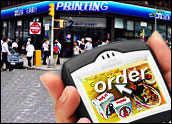
Comcast just bought itself a nice little present for the holidays: NBC Universal. The cable network will have a controlling stake in NBC once the deal is flattened out, and in return, it’s giving General Electric US$6.5 billion along with $7.25 billion worth of programming. If everything passes muster with regulators, then Comcast will go from being a company that just distributes creative content to one that makes and distributes it.
Clearing regulators is not necessarily going to be a cakewalk, though. Already some members of Congress are calling for hearings to determine the merger’s impact on consumers. What happens in those hearings may force Comcast to make some concessions.
But what if the deal goes down pretty much the way Comcast wants it? Well, you may see a lot of funny things happening. There may be some strange changes in store for NBC and the cable channels that fall under NBC’s umbrella. You may not have the same access to online TV shows through portals like Hulu, and you might not able to find a football game you want to watch next season. Your cable line-up could be different, even if you’re not a Comcast customer, and maybe you’ll see a change in what you pay for television.
Comcast is a big cable player and a big ISP; now it’ll be a big producer of a lot of shows that get played through those channels, and that raises some questions. For instance, is it going to let Time Warner carry the USA Network, or will people have to switch to Comcast in order to get their nine hours of “Law and Order” per day? Will it let DirecTV broadcast the game if it’s on NBC Sports? Will it let you access Hulu through your Comcast broadband connection, or will it make you bundle in a cable plan as well — or will it let you access it only if you’re a Comcast subscriber? Is Comcast going to jack up NBC licensing fees to other cable companies, forcing them to jack up their prices to customers?
I guess we’ll just have to be patient — “30 Rock” will explain everything eventually, I’m sure.
Hard-Charging Shoppers
About this time last year, we were being told we might have to burn $50 bills to heat the living room before winter was over, so it’s good to see a sign that consumer moods might be lightening up a little. Online shoppers were a bit looser with their credit cards on this year’s Cyber Monday — 13.7 percent looser, to be exact, according to Coremetrics.
But online consumers are getting stingier with their time. Stats indicate that even though they’re spending more and buying more items, they’re doing it more quickly, and they’ll ditch your page in a heartbeat if you make it difficult for them to find what they want. Multi-page and browsing session times were down about 6 and 5 percent, respectively, meaning less time spent mindlessly wandering the virtual aisles. That may have as much to do with site designers getting better at their jobs as it does with shoppers not wanting to waste time. If a site does waste a shopper’s time, though, don’t count on keeping anyone’s attention for long — bounce rates shot up by nearly 18 percent this year.
Of course, it’s not like zero online holiday sales are rung up before Cyber Monday; lots of etailers get started earlier than that by jumping in with their own Black Friday promos. Those seemed to work also — online spending grew 11 percent over last year, according to comScore.
Kindle on Fire
Ask Amazon how its Kindle sales are doing, and it’ll say they’re great — better than ever, in fact. It just won’t give you any actual numbers. So when it called November its best Kindle sales month ever, we could only assume it was because it sold a lot of units, though we could just as easily assume it was because each sale was more fun or more satisfying on a personal level.
But, yeah, Amazon’s probably talking dollars. It got a flood of traffic over Thanksgiving and Black Friday — 13.55 percent of the traffic among 500 major etailers, according to Hitwise — though it wouldn’t say whether the figures that made November its best Kindle month ever took those late-in-the-month sales into account.
Despite its reluctance to get specific, Amazon clearly has the e-bookworm market in a headlock, complete with noogies. Its product has a high profile in its category, a huge name behind it, and nice big head start compared to Barnes & Noble, which is having trouble getting its Nook out the door in time for the holidays.
Sony might be seeing similar problems with its Daily Edition reader. If one-third of e-reader sales this year occur in November and December, as has been predicted by Frost & Sullivan’s James Brehm, it’s Amazon for the win.
But that’s only this holiday season. Beyond that, once competitors have had time to collect themselves, Amazon may have to work harder to maintain that lead. Barnes & Noble will be able to sell the Nook in its stores, where people can touch and use one before they buy. Sony may not be known as a huge bookseller, but it does have a huge e-bookstore, and it’s got a long history of device manufacturing.
And who knows what Apple’s going to do? For now, there’s still room for everyone to grow. In-Stat’s Stephanie Ethier told us that e-reader sales could more than double to $2 billion by the end of next year.
Free Press
A few weeks ago, media mogul Rupert Murdoch said he wanted to do something about getting those Google kids to stay off his lawn — metephorically speaking, of course. He was talking about protecting News Corp.’s online publications like the New York Post and the Wall Street Journal.
The Google News aggregator page sends an incredible number of readers to those publications and thousands of other pubs every day. But Murdoch doesn’t think the traffic’s worth it, especially since Google users can sometimes get around the Wall Street Journal’s paywall by using its First Click Free feature — over and over again.
So after Murdoch talked about maybe cutting his publications off from Google completely, the search engine came up with a new way for publishers to connect their sites with Google News. The so-called five clicks free option lets a user read five articles behind a publication’s paywall per day. Once you’re done with those stories, you get no more of their content until tomorrow, unless you care to buy a subscription.
This might be interpreted as a blink or capitulation on the part of Google, which has been playing a sort of slow-moving game of chicken with publishers for months. The timing certainly suggests it’s a reaction to Murdoch’s threats. But Kathy Gill with the University of Washington’s digital media program has a different take. She pointed out to us that publishers have always had the option to shut Google News’ Web crawlers out of their sites completely.
If they really don’t want to get picked up on Google News, there’s an easy way to avoid it. It’s just that they’ve chosen not to. Even the Wall Street Journal, which is one of the only major online publications to successfully demand subscription fees from readers, allows its content to be accessed for free by Google News users.
The Journal is on the First Click Free program, which could theoretically let you read almost the entire paper at no charge every day, as long as you read each article exactly once and access it through Google. So perhaps this five-clicks-free setting is more about Google offering a more moderate option than the all-or-nothing extremes.
Redrawing the Map
It’s hard to compete by going where your rival is not when your rival is everywhere. Bing seems to be in that position as it tries to take a bite out of Google’s market share, so instead it’s going the same places Google is, just doing things a little differently.
Bing introduced a new beta for Bing Maps, and much like Google Maps, it includes a feature that lets you get down on street level and look around as though you’re an actual person on the ground, rather than a bird flying overhead. Bing calls it “Streetside.” The beta also features an Application Gallery with apps that overlay information from Twitter and other services. Users can see tweets pop up at the location from which they’re tweeted, or see local blog posts related to what they’re looking at on the map using a tool called “Local Lens.”
Beta users can also see some areas and landmarks in 3-D, courtesy of Photosynth, which takes a bunch of various 2-D photos of an area, mixes them together, and comes up with a composite 3-D image. Sounds neat, but remember it’s still in beta, so your mileage may vary.
Survival Instincts
When Mac clone maker Psystar first surfaced, the odds were clearly against it, and it was no bold prediction to say Apple would launch the nukes pretty soon. Sure enough, they landed right on target: A California court granted a summary judgment in favor of Apple. [*Correction – Dec. 16, 2009] The company agreed to pay $2.7 million to Apple to settle the case — this after reportedly only selling 768 Mac clones for a few hundred dollars apiece during its brief, uh, heyday as a would-be challenger.
But Psystar still seems to be struggling for life. It’s preparing an appeal, even though it agreed to the settlement. That’s not exactly bizarre — appeals take a long time to put together, there are deadlines involved, and you want to have your bases covered in case the settlement falls through. Then there’s the little fact that Psystar won’t have to pay the damages until the appeals process is exhausted, according to its lawyers. Could take years.
It also appears that Psystar may have hopes to actually survive Apple’s stomping. The startup seems to want to make sure the injunction isn’t so broad-ranging that it would include the Snow Leopard operating system.
Just speculating here, but maybe it wants to redo the entire case in its native Florida, bring Snow Leopard into the mix there, and in the end win the right to sell something called “Rebel EFI,” which is a tool that lets consumers, rather than the box-builder itself, install OS X on a generic computer. So it’s a third-party app you use on a no-name white box to run an OS that doesn’t want to be there and could brick itself with the next update from Apple, which has already shown it has a heavy grudge against the company that makes it.
Not exactly the same thing, but I think Palm may have some words of wisdom on the general topic, as in now you see iTunes, now you don’t.
Kicked While Down
Not a great week for AT&T in its rivalry with Verizon. First AT&T decided to walk away from its fight over Verizon’s map commercials — the ones that display images of the two carriers’ 3G maps alongside each other in a way that AT&T thought was misleading. Things weren’t going AT&T’s way in court, so it apparently backed off the legal battle, though I guess it’s still got some Luke Wilson ads to throw Verizon’s way.
Then came a nice little kick in the head from Consumer Reports, which released results of a survey of 54,000 people in 16 major U.S. cities on how they felt about whichever of the four major networks they subscribed to: Verizon, AT&T, Sprint or T-Mobile.
Survey says: AT&T sucks, Verizon rules. Actually, the industry as a whole didn’t exactly come out looking golden. Only 54 percent of people overall said they were completely or very satisfied with the cellphone carrier, and that’s not very high compared to most of the other services Consumer Reports rates.
But Verizon did win this round, followed by T-Mobile and Sprint. I should add that the survey was actually carried out before October, so some of T-Mobile’s Sidekick users might wish they could change their responses at this point.
Anyway, AT&T came in dead last. All carriers got beat up at least a little in price, but where AT&T really seemed to screw up was in quality of service — fuzzy signals and too many dropped calls. AT&T’s excuse for that is success — it’s the sole carrier of the iPhone in the U.S., and those things really chow down that wireless data, causing more strain on the network.
Spokesperson Mark Siegel made a point of mentioning that it’s not just the iPhone, but the many smartphones that AT&T offers that make its network so busy. And he insisted that the company is spending big to upgrade its infrastructure, so things will get less frustrating eventually.
Robotic Erotic
One of the slogans for the new Verizon Droid phone is that it does what iPhone doesn’t do. Motorola and Verizon will be happy to supply you with a list of features that fit that bill, but they probably won’t mention the fact that the Droid is willing to do a lot of naughty stuff that the iPhone’s chaperones at the App Store would never dream of allowing. So are all other Android smartphones, for that matter,
Unlike iPhone, the Android platform is a development free-for-all — devs can write almost any kind of application they want and distribute it at will. Most of these apps are distributed through the Android Market, but a company called “MiKandi” wants to open its own shop on the seedier side of town. As it’s envisioned, the MiKandi store will be a place for adult-oriented Android apps. The only limits will be the developer’s own twisted imagination and, you know, the law — MiKandi may be smutty, but it’s not trying to trade in anything illegal.
So is there anything that Android phone makers can do about this — HTC, Motorola, etc.? What about the carrier networks? What if they don’t want to be associated with all this debauchery? Well tough cookies for them, according to MiKandi’s cofounder Jennifer McEwen, who pointed out that members of the the Open Handset Alliance must support the openness of the Android platform. As she told us, “Restricting or blocking MiKandi would violate the spirit of the OHA. Under this open platform, we have built an independent marketplace that is not subject to Google or anyone else’s approval.”
I guess “open” means “open,” for better or for worse. It’s your Android — do what you want with it.
*ECT News Network editor’s note – Dec. 16, 2009: Our original version of this article stated that the court issued a permanent injunction against Psystar in November. In fact, Apple filed its motion for a permanent injunction on Nov. 24, but the court did not grant it until Dec. 15.























































Social Media
See all Social Media